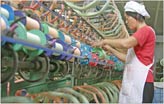Web Comments
US social safety net in peril
Updated: 2011-06-10 12:47
By Nathan Place (chinadaily.com.cn)
There are some scary words being said back home about my country's economy. According to just about every Republican I can think of, my country is "broke."
America must rein in its spending on social welfare programs, they say, in order to avoid "catastrophic" results. Social Security must be altered, Medicare needs a complete rethinking, pensions for government workers must be cut back or even eliminated - everything must go. Otherwise, according to House Majority Leader Paul Ryan, "the unsustainable trajectory of government spending" will send us into "a ruinous debt crisis." Ruin! Crisis! Broke!
Forgive me for getting sentimental, but all this talk of impending doom reminds me of 2002. Back then, Republicans were warning us of another approaching catastrophe: the imminent nuclear attack on the United States by Iraq.
That may sound just as alarmist as the screaming about deficits, but hear me out. The central tactic the Bush administration and its allies used to get the public's consent for their war in Iraq was to deliberately conflate two distinct problems: one, the threat of terrorism, and the other, the dictatorship of Saddam Hussein.
As we have seen since then, these two problems were not at all connected. But in the panicked, hysterical atmosphere of late 2002 and early 2003, fueled by lies and innuendo that went unchallenged or even inflated by the news media, Americans began to believe they were, and the Republicans got their war. Today, to scare Americans into supporting their war on the welfare state, Republicans are conflating two economic problems: the recession and the national debt.
So before we start hacking away at the social safety net, let's look at what these two words actually mean.
On the one hand, there's the recession, which is happening now and entails low GDP and high unemployment. To combat that, you need increased spending from somewhere, which, in terms of what governments can do, mainly means increasing government spending. The national debt, on the other hand, is just the money we owe other governments and institutions to fund our deficit, the gap between how much the federal government spends in a year and how much it takes in through taxes. Solving that problem requires just the opposite solution: a reduction in government spending (or an increase in taxes, which Republicans say is "off the table").
So these two problems are not only different, but in fact can't really be solved at the same time. Unfortunately, what the Republicans (and many conservative leaders in Europe) have gotten very good at is talking about the national debt as if they're talking about the recession, and giving the impression that reducing the debt means improving the economy.
They treat the debt, which has vaguely defined, long-term consequences, with all the urgency of the recession, which is costing people their jobs right now. Somehow, somewhere in the public consciousness, our wires have been crossed. We're installing smoke detectors while our house is on fire.
And yet, from listening to a Republican - or any of the mainstream pundits who already have - it sure seems like these two problems are connected. How? From Republicans, the answer is vague. "You can't get real, sustainable growth by continuing to pile on the debt," Congressman Ryan tells us. "More debt means more uncertainty, and more uncertainty means fewer jobs." What he means by "uncertainty" here, or how it does this, alas, is left uncertain. But let's fill in the blanks for him: the idea is that over time, as America's national debt builds up, so many private investors could potentially be scared out of the American economy that it could, conceivably, theoretically, lead to another recession remarkably similar to this one. In other words, there is no connection.
E-paper

Pearl on the Yangtze
Wuxi is considered a town of natural beauty and its motto is "city of water and warmth".
Prose and consternation
Riding on a mystery train
Way of a warrior
Specials

Wealth of difference
Rich coastal areas offer contrasting ways of dealing with country's development

Seal of approval
The dying tradition of seal engraving has now become a UNIVERSITY major

Making perfect horse sense
Riding horses to work may be the clean, green answer to frustrated car owners in traffic-trapped cities
